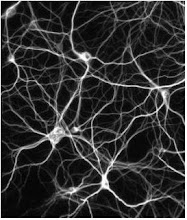It looks like there hasn't been any research on the neural basis of storytelling. Not so much as one neuroimaging study. It seems to be an unresearched thing. That is what I want to study. I want to study the way that brains tell stories. Which parts of the brain are active, what is going on in these parts, how does making up a story differ from telling one which is remembered, how does writing a story differ from speaking one. There are a lot of questions and all of them are rather interesting and would be easy to make studies about.
It would be interesting to see if the brains of people who tell stories for a living are different than other people. Do the sorts of stories you tell cause different brain morphology? If you are a trial lawyer and tell a certain form of story to juries how is that different from a writer telling a story? Is there some neural basis for the structure of stories. Other than semantics of language, does our neural network somehow determine the structure of stories.
Is there some neural basis to archetypes in stories.
I'm really shocked that no one has studied this yet. I may just not have found anything yet, and I'm going to keep searching, but that it's been this hard so far shows that there is so much stuff we don't know. It's also such and interesting intersection of various things neuroscience studies. It requires an understanding of the neural basis' of memory, language, social interaction. So much of what seems to separate us from other creatures is storytelling.
Some animal studies could be really interesting as well. It would be interesting to see if a Parliment of rooks is indeed being told a story by the rook in the centre. Where does the ability to tell a story begin.
This is great because it is also the intersection of two of my loves, Storytelling and Neuroscience.
anywho, I'm very excited about this and have been mulling it for a while. I still want to study mental illness as well, but the storytelling is interesting enough to be another focus of study.
Subscribe to:
Post Comments (Atom)

1 comment:
fyi, you might check out an article I did for the New York Times Magazine (june 6, 1999) in which we did a series of MRI scans of my brain while I was making up a story--not a "study," obviously, with an n=1, but a tentative proof of principle.
Steve Hall
Post a Comment